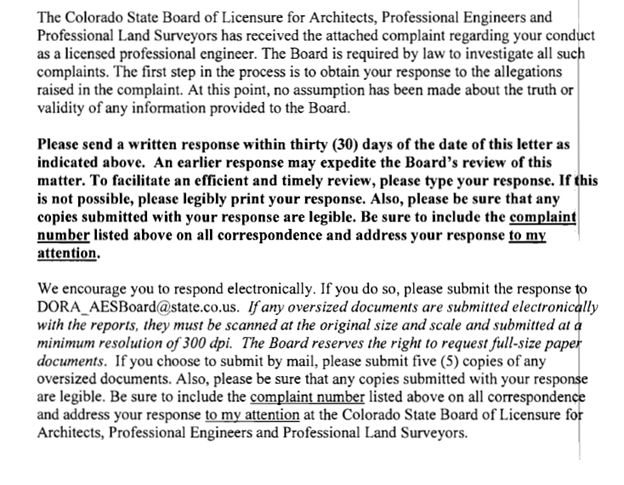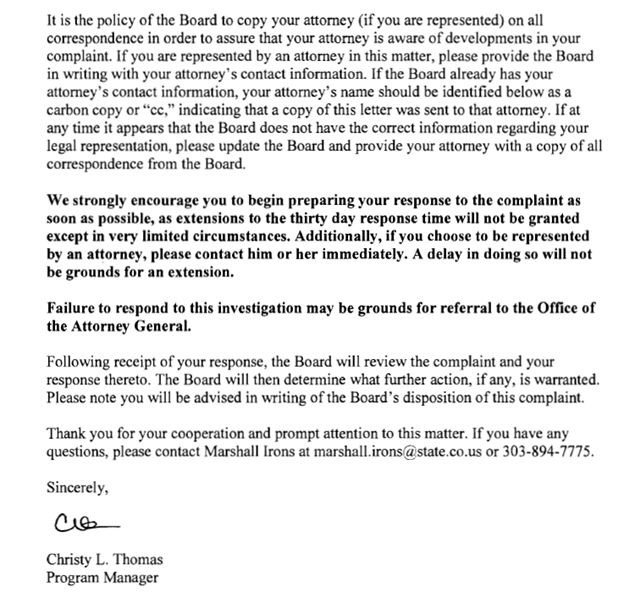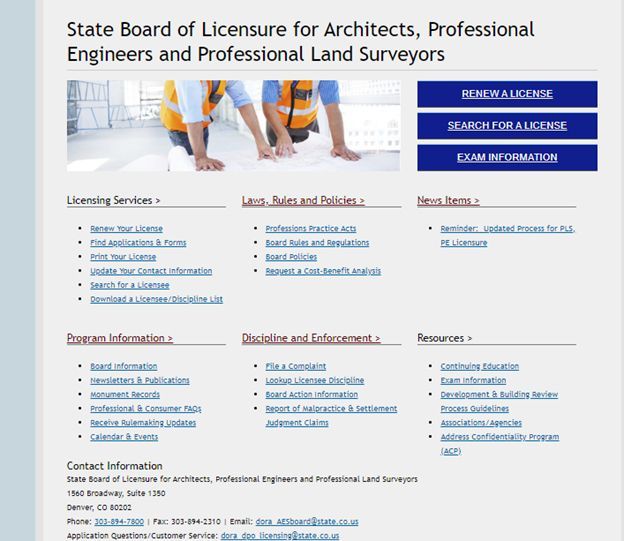An unpleasant Notice: A Colorado licensed Professional Engineer receives a letter from the Colorado Board of Architects, Professional Engineers and Professional Land Surveyors (Board). The letter is sent from the Board because:
- Someone filed a complaint against your license;
- You failed to renew your license;
- Someone filed a lawsuit against you (or your company) and when finished with the lawsuit you must file a report to the Board.
Here are how these three scenarios may play out:
Scenario 1: Someone Complains about your Services
You get a letter from the Colorado Board of Architects and Engineers because someone filed a complaint with the Board. The Board wants information from you in writing within 30 days because your client/another engineer/a building department official filed a complaint about your services with the Board.
Here’s what the Board’s letter looks like:
Dear Engineer:


Your response to the Complaint: Respond within the 30 days that the Board requested. If you need more time, ask for it. If you have a good reason, you are likely to get the extension. Be truthful. Be honest. Admit any mistakes. Explain the facts. Provide any mitigation. Provide your relevant project file that is at issue.
If you have professional liability coverage, most professional liability policies provide coverage for responding to Board complaints. i.e. the insurance pays for the attorney to help respond. Therefore, notify your professional liability carrier.
Board Action after your Response: The Board has its meetings on the second Friday of each month. Your matter will be set at the first meeting after you file a response. During this meeting the Board reviews complaints and responses that are on the agenda for that month. The Board may take action that month or table it for the next month’s Board meeting. The Board’s agenda is posted on its website. The action taken at the Board meeting are posted on the Boards’ website – but it usually takes until the next Board meeting to post the last meeting minutes. (i.e. In May, the Board approves the minutes from the last Board meeting (April) and then posts those April minutes on its website in May.)
The Board has many options after you respond. These include dismissing the complaint, writing a letter of admonition, writing a letter of concern, requesting a stipulation requiring probation (including remedial learning + a fine), and suspending/revoking a license pending a hearing.
Scenario No. 2: Failing to renew your license
You receive a letter from the Board that you did not renew your license and you continued to practice engineering without a license. It turns out your office manager/admin person/you forgot to renew your license. On its face this seems like it is a minor issue, BUT THIS IS A HUGE PROBLEM!!!
Your response to practicing without a license: Admit it. Take care of it. Pay your fine. Enter into your stipulation with the Board. Do not stamp any plans until your license has been re-established. This is a strict liability issue and you have no defense other than telling the Board how this slipped through the cracks. Be proactive and do not let this happen. It is your duty to check the status of your license, the renewal time and whether it has been renewed. It’s surprising how common this failure to renew a professional engineering license occurs.
Be prepared to have all of your work peer reviewed that occurred while you practiced without a license. Be prepared to pay for these peer reviews. You have no defense to the request for a peer review. This is an expensive problem.
If you have a malpractice claim asserted against you during the time you forgot to renew your license you have NO LIABILITY DEFENSE. i.e. no licensed engineer can testify that it is within the standard of care to practice engineering and stamp plans without a license.
Scenario No. 3: Report of Malpractice or Settlement
After a lawsuit is resolved through settlement or a trial (Judgment) you must report to the Board the circumstances of the lawsuit and the result. Even if you win at trial you have to file a report.
You also have to tell the Board what other professional engineers (or architects or land surveyors) were sued. If you do not file a report with the Board and another engineer was involved in the case, that engineer will tell the Board a claim was brought against you and then the Board will send you a letter asking you why you did not report the claim. This gets you off on a bad foot with the Board and they are likely to take a harder look at your engineering services.
Again, your professional liability insurance may provide coverage for a lawyer to help you through the reporting requirements to the Board.
The Board can respond to a report of malpractice/settlement the same as it could to a complaint: These include a letter acknowledging the report and no further action taken (akin to dismissing the matter), writing a letter of admonition, writing a letter of concern, requesting a stipulation requiring probation (including remedial learning + a fine), and suspending/revoking a license pending a hearing.
Take Aways:
Board viewpoint: Your duty is to protect the Life, Health and Welfare of the Public.
Riley viewpoint: Your P.E. license is an asset to you. Protect it. DO NOT BE LAZY AND LET YOUR LICENSE EXPIRE!!
Respond to the Board timely, sincerely, and with full disclosure.
To Do:
Here is the Home Page to the Board’s website: https://www.colorado.gov/pacific/dora/AES. Take a look at it to see what information is available to you and the public.

